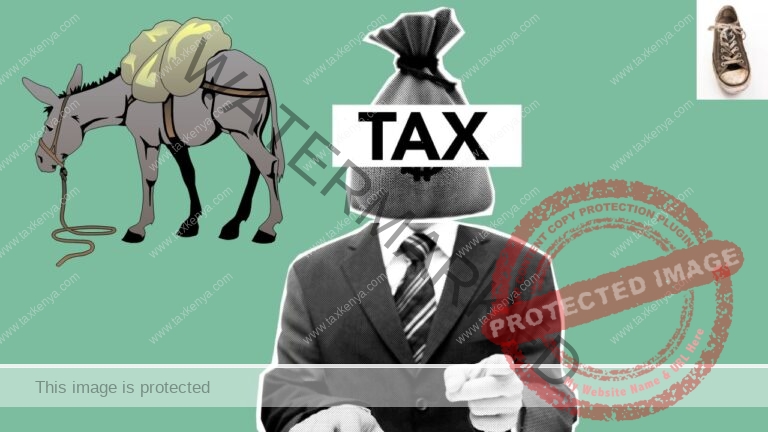Taxpayer’s registration is covered in the VAT Act, 2013. This post is on VAT registration.
Scope
- Application for VAT registration.
- Display of VAT registration certificate.
Taxpayers Registration
Taxpayer’s registration is covered in Part IX – Sections 34 – 37. Registration means putting into the list of persons who should comply with the provisions of the VAT Act (2013). This involves identification of taxpayers:
- Supplying taxable goods and services with an annual taxable turnover of kshs 5 million or more.
- Expects to supply taxable goods and services with annual taxable turnover Kshs 5 million or more,
It is important to note that VAT is charged, collected and remitted by VAT-registered persons only. Under the VAT law, it is an offence to charge VAT if one is not registered for VAT. Only registered persons charge VAT as per the effective date of registration indicated on the certificate issued. Failure to charge VAT after registration is an offence. Charging VAT before registration is also an offence. Tax law also provides for voluntary registration. Currently, VAT registration is done through i-Tax platform.
Question – is kshs 5million a fair threshold?
Potential Persons for VAT Registration
There are various indicators of persons who should be registered for VAT. The following are some of the indicators.
- Person has a business (age limit, the legality of business?)
- Person has made taxable supplies the value is Kshs 5m or more in any period of 12 months.
- Person expects to make taxable supplies the value is Kshs 5m or more in any period of 12 months.
- Persons are about to commence making taxable supplies – value expected to exceed Kshs 5m in any period of 12 months (whether 1 or several transactions.
Determining VAT Registration Threshold
When determining the VAT registration threshold, the following should be excluded:
- Sale of any capital item of the person (e.g. a machine).
- Supply made as a consequence of the person:
- Selling whole or part of the person business,
- Permanently ceasing to carry on the business (e.g. selling of final stock).
Who Should Register for VAT?
Various persons transacting business that is subject to VAT qualifies to be registered. The following are some of the persons who qualify for VAT registration in Kenya:
- Individuals trading in own names.
- Sole proprietors (registered businesses) – registration is for the individual business owner.
- Partnerships (including husband and wife who may or may not be VAT registered).
- Limited liability (Private and Public) companies, partnerships.
- Any other type of businesses that do not fit in any of the above category e.g. Churches.
Types of VAT Registrations
There are various types of VAT registrations depending on the circumstances.
a. Normal registration
The business owner qualifies to be registered, applies for registration, is duly registered and VAT obligation added to the PIN certificate.
b. Voluntary registration
The business owner does not qualify to be registered but applies for registration to benefit from being a registered person.
c. Intending trader registration
The business owner expects to deal in taxable supplies and will apply for registration before any transactions commence.
d. Compulsory registration
The business owner qualifies to be registered but fails to register. The Commissioner adds the VAT obligation in the PIN certificate and an email notice is sent.
e. Temporary registration
This is an internal mechanism for crediting tax received from a trader who is not VAT registered. These are KRA internal transactions.
Documents Required for VAT Registration
Various documents and details are required for VAT registration.
a. Individuals
- PIN certificate (number) of the individual.
- National identification card (number), or
- Alien identification card (number).
- Actual or expected taxable turnover amount kshs 5.0 million or more for 12 months.
- Email address and physical location.
- Access to i-Tax platform.
b. Sole proprietorships
- PIN certificate (number) of the proprietor.
- Sole proprietor identification card.
- Alien identification card (for foreigners).
- Certificate of business name registration.
- Actual or expected taxable turnover amount kshs 5.0 million or more for 12 months.
- Email address and physical location.
- Access to i-Tax platform.
c. Partnerships
- PIN certificate of the partnership.
- PINs of the partners.
- Copy of the business name registration – from the Registrar of companies.
- Actual or expected taxable turnover kshs 5.0 million or more for 12 months.
- Email address and physical location.
- Access to i-Tax platform.
d. Limited Company (private and public)
- PIN of the company.
- PIN of every director (local and foreign).
- Copy of incorporation certificate.
- Memorandum and Articles of Association.
- Actual or expected taxable turnover kshs 5.0 million or more for 12 months.
- Email address and physical location.
- Access to i-Tax platform.
e. Any other potential VAT taxpayer
- PINs (organization’s and directors).
- Copies of registration documents.
- Other registrations (e.g. from NGO board).
- Actual or expected taxable turnover kshs 5.0 million or more for 12 months.
- Email address and physical location.
- Access to i-Tax platform.
Commissioner’s Registration Decision
- Normal registration (actual and expected) – obligation is included in the PIN certificate.
- Compulsory registration – obligation is included in the PIN certificate.
- Voluntary registration:
Application accepted
VAT registration is done and obligation included in the PIN certificate.
Application declined
VAT registration is declined and obligation not included in the PIN certificate.
Indicators of voluntary registration qualifications:
- Person making or shall make taxable supplies.
- Fixed place of business operation (???).
- If the business is in operation:
- Proper business records are maintained.
- Person has complied with obligations of other tax revenue laws (e.g. income tax).
- There are reasonable grounds to believe the person will maintain proper records and file regular and reliable tax returns.
Effective Tax Registration Date
This is normally referred to as EDR. The following are the EDRs for various registrations:
- Normal registrations (actual and intending business) and compulsory registrations:
- beginning of the first tax period after the person was required to register or
- a date specified in the certificate.
- Voluntary registration – date specified in the certificate.
Group Registration
Section 34 (9) of the VAT Act allows the CS to the National Treasury to provide registration for a group of companies as one registered person. The registration can also be initiated by the CS or the taxpayer.
Certificate Display
Section 35 of the VAT Act provides for display of the PIN certificate with VAT obligation as follows:
- Original – at the principal place or in a conspicuous place all the time.
- Copies – any other place the person carries on business.
Changes in Registration Details
Occasionally, a VAT registered taxpayer may change various details that they provided during VAT registration. The following are some of the details that may be changed:
- Name registered.
- Address (physical and email).
- Place of business (building or location).
- Nature ( additions or subtractions, goods, services etc.)
In case of any changes, the law requires that the VAT-registered taxpayer must communicate the changes to the Commissioner within 21days.
Summary
- Registration is by taxpayer or Commissioner.
- No separate certificate is issued – VAT obligation is included in PIN certificate.
- Registration and de-registration are done online.
Feel free to send us tax and investments in Kenya questions or topics via email taxkenya@gmail.com that you would wish to be covered in this Website.
Disclaimer
This post is for general overview and guidance and does not in any way amount to professional advice. Hence, www.taxkenya.com, its owner or associates do not take any responsibility for results of any action taken on the basis of the information in this post or for any errors or omissions. Kenyan taxpayers must always rely on the most current information from KRA. Tax industry in Kenya is very dynamic.




